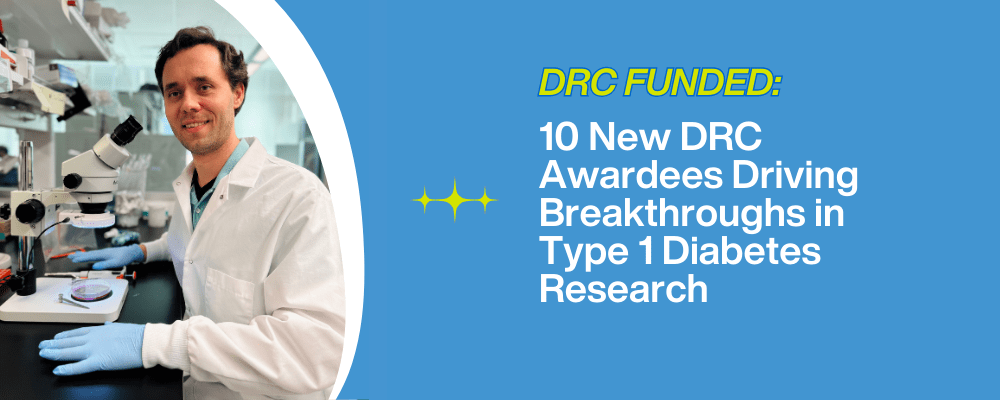May is Mental Health Awareness Month, a time to focus on mental well-being. For those living with type 1 diabetes (T1D), the challenge is twofold, grappling not only with the physical demands of managing a chronic condition but also with the significant mental health burdens that often accompany it.
The intersection of T1D and mental health is complex and deeply interconnected, as daily regimens of blood glucose monitoring and fear of potential complications can lead to heightened stress, anxiety, and a profound impact on mental wellness.
Living with T1D requires more than just medical management; it demands a comprehensive approach that includes substantial support for mental health. This Mental Health Awareness Month, we spotlight the hidden battles many face, particularly the correlation between T1D and eating disorders, to emphasize the critical need for supportive mental health resources in the T1D community. Our goal is not just to manage diabetes but to ensure that those affected lead full and mentally healthy lives, underscoring the importance of addressing mental well-being alongside physical health.
It is estimated that one in every four individuals aged 16 or older with T1D may be struggling with an eating disorder. Additionally, women with T1D are more likely to develop these disorders compared to men, though age does not seem to be a determining factor. This highlights the critical need for increased awareness and targeted support for everyone in the T1D community.
For more insights don’t miss our Q&A with Dr. Mark Heyman on the Diabetes Research Connection (DRC) website as we delve into the intricacies of managing T1D and its psychological impacts. Read the full Q&A with Dr. Mark Heyman here.
The Link Between T1D and Eating Disorders
Individuals with T1D face an often overlooked yet significant risk: the development of eating disorders. This heightened risk stems from the intense focus on food management and body metrics inherent in T1D treatment. Daily, those with T1D must carefully balance insulin doses with eating habits, a process that can inadvertently sow the seeds of food anxiety and disordered eating patterns.
Eating disorders in the context of T1D include unique challenges like food anxiety and complex body image issues. For instance, the constant emphasis on diet control can exacerbate feelings of deprivation or lead to obsessive behaviors around food, both of which can disrupt healthy eating practices. Moreover, the necessary vigilance over body weight and food intake can distort self-image, driving unhealthy methods to control weight beyond medical recommendations.
Additionally, the need for dietary management in diabetes care sometimes worsens these problems. Regular carb counting and food weighing, intended to stabilize blood glucose levels, may deepen the fixation on food quantity and quality, pushing some towards harmful eating habits. This blending of necessary diabetes management with potential triggers for eating disorders creates a delicate balance that must be navigated with care to prevent the development of further mental health issues.
At the beginning of the attached video, we hear from Hannah (diagnosed with T1D at the age of seven), as she shares her journey with mental health and battling an eating disorder when she was younger. Her story illuminates the complex relationship between managing daily diabetes care and the psychological challenges of maintaining a healthy body image and relationship with food.
This firsthand account not only sheds light on the emotional and mental struggles that accompany T1D and eating disorders but also underscores the critical need for awareness and supportive care. Watch the video to gain a deeper understanding of the personal impact and resilience required to navigate this hidden battle.
Diabulimia and T1D
Diabulimia is a severe eating disorder unique to those with T1D, characterized by the intentional restriction of insulin to control or lose weight. This dangerous practice is alarmingly prevalent, especially among women with T1D. The term “diabulimia” is commonly used to describe this condition, where skipping or under-dosing insulin leads to elevated blood glucose levels and the excretion of glucose through urine, effectively purging calories.
The health risks associated with diabulimia are profound, including rapid weight loss, recurrent diabetic ketoacidosis (DKA), and long-term complications such as retinopathy, nephropathy, and neuropathy. Despite the severe consequences, awareness and understanding of diabulimia remain limited, even within the diabetes community.
Recognizing the Signs and Impact
Early detection of eating disorders among individuals with T1D is crucial due to the profound consequences they can have if left unchecked. Symptoms to watch for include extreme concern with body weight and shape, unusual eating habits like excessive restriction or binging, and manipulation of insulin to control weight. Physical signs such as fluctuations in weight, dental problems from purging, or the worsening of diabetes-related health conditions may also indicate the presence of an eating disorder.
The impact of these disorders extends beyond physical health deterioration, including severe mental health repercussions. When eating disorders coexist with T1D, they can exacerbate feelings of anxiety and depression and may lead to a dangerous cycle of poor self-management and medical non-compliance. This combination is particularly dangerous, as improper insulin usage or dietary restrictions can lead to life-threatening situations DKA or severe hypoglycemia.
Understanding these signs and their potential impact on health is vital. It emphasizes the importance of awareness and intervention to prevent the long-term physical and psychological damage associated with eating disorders in the T1D community. Early detection and timely treatment are imperative to safeguard overall health and well-being.
Seeking Support and Treatment
For those grappling with the dual challenges of T1D and eating disorders, seeking professional help is not just advisable—it’s essential. Treatment for these complex conditions requires a coordinated effort involving many healthcare professionals. Endocrinologists can manage the diabetes-specific aspects, while psychologists address the mental health issues related to eating disorders. Nutritionists can also play a critical role by helping to develop eating plans that respect the medical and psychological needs of the individual.
A multidisciplinary approach ensures that treatment is holistic and tailored, addressing both the symptoms and the root causes of the eating disorder within the context of T1D management. This comprehensive care is crucial to improving health outcomes and overall quality of life.
Beyond professional healthcare, support networks are invaluable. Online communities and local support groups provide emotional support, practical advice, and a sense of community that can make the journey less isolating. These networks allow individuals to share experiences and strategies, learn from others facing similar challenges, and gain emotional strength from knowing they are not alone. Exciting advancements, such as the New Signal to Halting T1D, offer hope and inspiration for the community.
Encouraging the use of these resources is fundamental in the treatment process. They not only help manage the conditions but also empower individuals with T1D and eating disorders to lead healthier, more fulfilled lives.
Reinforcing the Support Network through Community and Research
As we conclude our exploration of the hidden battle between T1D and eating disorders, it’s clear that addressing the mental health needs of the T1D community is imperative. The intersection of these conditions presents unique challenges that require a sensitive, stigma-free approach to both support and treatment. Recognizing the importance of mental well-being is just as vital as managing physical health, and this awareness should guide our actions and interventions. For more insight into innovative T1D research, explore our previous blog, Mice to Men, which highlights promising developments in diabetes treatment.
DRC plays a pivotal role in this journey, providing essential funding for research aimed at uncovering better treatments and support mechanisms for those affected by T1D. Through continuous study and innovation, we can improve the quality of life for individuals living with these complex conditions.
We invite you to support this important work. Your donations help fuel groundbreaking research that opens new possibilities for care and support, making a profound impact on the lives of those with T1D and their families. Join us in making a difference – support DRC today to aid in the discovery of new insights and better health outcomes for the T1D community.
To explore more about T1D and the psychological challenges it entails, including eating disorders, be sure to read our Q&A with Dr. Mark Heyman. His expertise offers invaluable perspectives and guidance on these critical issues. Access the full conversation with Dr. Mark Heyman here.




